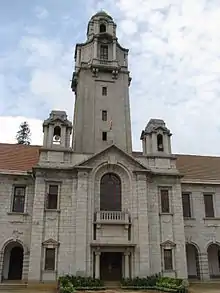Ambarish Ghosh | |
|---|---|
| Born | 18 December 1973 Kolkata, India |
| Nationality | Indian |
| Alma mater | |
| Awards | |
| Scientific career | |
| Fields |
|
| Institutions | |
| Doctoral advisor | Humphrey Maris |
| Website | http://www.cense.iisc.ac.in/ambarish/ |
Ambarish Ghosh is an Indian scientist, a faculty member at the Centre for Nano Science and Engineering (CeNSE), Indian Institute of Science, Bangalore. He is also an associate faculty at the Department of Physics. He is known for his work on nanorobots, active matter physics, plasmonics, metamaterials and electron bubbles in liquid helium.
Research work

Magnetic nanorobots
In 2009, he along with Peer Fischer demonstrated the use of glancing-angle deposition to fabricate magnetic helical nanorobots.[1] His group worked out the theoretical formulae to describe the dynamics of such nanorobots[2] and presented techniques for their independent control.[3]
In recent years his group has managed to demonstrate various applications of helical nanorobots including techniques to move in important biological environments, such as blood.[4] and as probes for sensing[5] the environment inside living cells.[6][7]
Plasmonics and Metamaterials
Ambarish Ghosh and his group demonstrated a wafer scale technology to fabricate porous 3D plasmonic metamaterials which can be used over a wide range of wavelengths, including the visible. These metal-dielectric nanostructured films can be made in various geometries[8][9][10] and configurations. Very recently, they have demonstrated a novel technique to integrate plasmonic nanoparticles with graphene in a sandwich configuration, allowing them to achieve unprecedented electromagnetic field enhancement and photodetection sensitivity.[11] In 2019, his group showed the application of metal-dielectric hybrid nanorods in active opto-fluidic manipulation of sub-micron colloids.
Electron bubbles in Liquid Helium
The group led by Ambarish Ghosh demonstrated trapping[12] of multielectron bubbles in liquid helium-4, which can open up new avenues in the study of two-dimensional electron systems at high densities, and on curved surfaces. The same group also performed high speed imaging[13] of the "explosion" of an electron bubbles triggered by focused ultrasound.
Recognition
Ambarish received the Young Career Award in Nano Science and Technology for 2017 from DST Nanomission, India. The Council of Scientific and Industrial Research, the apex agency of the Government of India for scientific research, awarded him the Shanti Swarup Bhatnagar Prize for Science and Technology for his contributions to physical sciences in 2018.[14] He received the Prof. Ramakrishna Rao Chair Professorship[15] from 2017–2020. He was elected as Fellow of INAE (Indian National Academy of Engineering) in 2020.[16]
References
- ↑ Ghosh, Ambarish; Fischer, Peer (10 June 2009). "Controlled Propulsion of Artificial Magnetic Nanostructured Propellers". Nano Letters. 9 (6): 2243–2245. Bibcode:2009NanoL...9.2243G. doi:10.1021/nl900186w. PMID 19413293.
- ↑ Ghosh, Arijit; Mandal, Pranay; Karmakar, Suman; Ghosh, Ambarish (2013). "Analytical theory and stability analysis of an elongated nanoscale object under external torque". Physical Chemistry Chemical Physics. 15 (26): 10817. Bibcode:2013PCCP...1510817G. doi:10.1039/c3cp50701g. PMID 23694848.
- ↑ Mandal, Pranay; Chopra, Vaishali; Ghosh, Ambarish (17 April 2015). "Independent Positioning of Magnetic Nanomotors". ACS Nano. 9 (5): 4717–4725. doi:10.1021/acsnano.5b01518. PMID 25824608.
- ↑ Ghosh, Souvik; Ghosh, Ambarish (10 January 2018). "Mobile nanotweezers for active colloidal manipulation". Science Robotics. 3 (14): eaaq0076. doi:10.1126/scirobotics.aaq0076.
- ↑ "Nanorobots as Mobile Viscometers".
- ↑ Pal, Malay; Somalwar, Neha; Singh, Anumeha; Bhat, Ramray; Eswarappa, Sandeep M.; Saini, Deepak K.; Ghosh, Ambarish (May 2018). "Maneuverability of Magnetic Nanomotors Inside Living Cells". Advanced Materials. 30 (22): 1800429. doi:10.1002/adma.201800429. PMID 29635828.
- ↑ Ghosh, Arijit; Dasgupta, Debayan; Pal, Malay; Morozov, Konstantin I.; Leshansky, Alexander M.; Ghosh, Ambarish (June 2018). "Helical Nanomachines as Mobile Viscometers". Advanced Functional Materials. 28 (25): 1705687. doi:10.1002/adfm.201705687.
- ↑ Johnson Singh, Haobijam; Ghosh, Ambarish (4 September 2012). "Porous Three Dimensional Arrays of Plasmonic Nanoparticles". The Journal of Physical Chemistry C. 116 (36): 19467–19471. doi:10.1021/jp3062702.
- ↑ Singh, Johnson Haobijam; Nair, Greshma; Ghosh, Arijit; Ghosh, Ambarish (2013). "Wafer scale fabrication of porous three-dimensional plasmonic metamaterials for the visible region: chiral and beyond". Nanoscale. 5 (16): 7224. Bibcode:2013Nanos...5.7224S. doi:10.1039/C3NR02666C.
- ↑ Singh, Haobijam Johnson; Ghosh, Ambarish (2018). "Harnessing magnetic dipole resonance in novel dielectric nanomaterials". Nanoscale. 10 (34): 16102–16106. doi:10.1039/C8NR04666B.
- ↑ Paria, Debadrita; Roy, Kallol; Singh, Haobijam Johnson; Kumar, Shishir; Raghavan, Srinivasan; Ghosh, Arindam; Ghosh, Ambarish (March 2015). "Ultrahigh Field Enhancement and Photoresponse in Atomically Separated Arrays of Plasmonic Dimers". Advanced Materials. 27 (10): 1751–1758. doi:10.1002/adma.201404312.
- ↑ Vadakkumbatt, Vaisakh; Joseph, Emil; Pal, Anustuv; Ghosh, Ambarish (1 August 2014). "Studying electrons on curved surfaces by trapping and manipulating multielectron bubbles in liquid helium". Nature Communications. 5 (1): 4571. Bibcode:2014NatCo...5.4571V. doi:10.1038/ncomms5571. PMID 25081283.
- ↑ "Electron Bubble Explosion in Liquid Helium".
- ↑ "Shanti Swarup Bhatnagar Prize (SSB) for Science and Technology 2018" (PDF). Shanti Swarup Bhatnagar Prize. 26 September 2018. Retrieved 26 September 2018.
- ↑ "Ramakrishna Rao Chair Professorship". Indian Institute of Science. Retrieved 3 November 2019.
- ↑ "Umanand L, Ambarish Ghosh, & Pramod Kumar have been Elected as of Fellows of The Indian National Academy of Engineering w.e.f. Nov. 1, 2020". Indian Institute of Science, Bengaluru. Retrieved 25 January 2021.